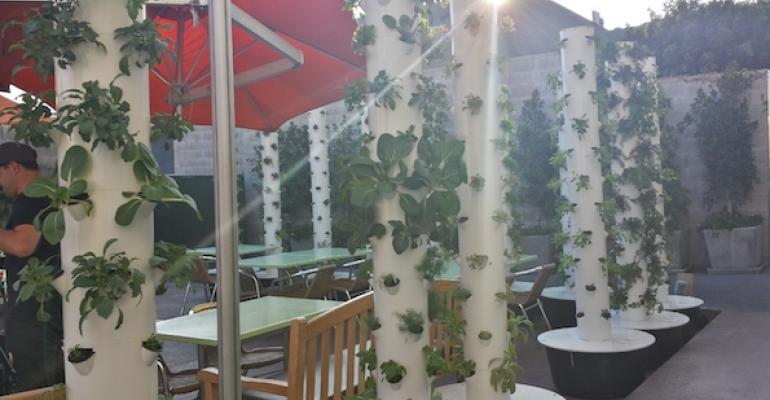 This post is part of the Reporter’s Notebook blog.
This post is part of the Reporter’s Notebook blog.
As the 17-unit Tender Greens gears up for growth outside California soon, the chain is developing some innovative techniques for supplying its restaurants with the most local of produce.
Los Angeles-based Tender Greens is working with several farms to develop hydroponic growing systems, including growing towers on the restaurant properties.
At the Tender Greens in Hollywood, for instance, eight-foot Aeroponic Tower Gardens ring the restaurant’s patio, allowing guests to dine alongside the very lettuce they may be eating. The towers are also being used at a downtown Los Angeles location and will be installed at restaurants scheduled to open in Torrance, Calif., and San Diego later this year.
Developed by Green City Farms, the towers use 95 percent less water than conventional farming – which is crucial in drought-ravaged California – in part because the water not absorbed by the plant is recycled. A nutrient mix adds vital minerals for plant and human health. And the towers open up local growing to urban locations, where there is little land space.
Erik Oberholtzer, Tender Green’s co-founder, said the 18 towers at the chain’s Hollywood location can produce about 1,000 to 1,200 heads of lettuce a month. The chain has been experimenting with heirloom plants and obscure varietals to spice up the daily specials on the menu.
“Where we used to have decorative plants, now we have these eight-foot hydroponic towers with 44 plants per tower in various stages of growth. We can harvest once per week,” he said. “From the guest perspective, the patio is always changing and growing.”

Produce is a vital component of Tender Green’s positioning as a farm-to-table concept that would fall into the “slow food done fast,” or “fine-fast” end of the fast-casual spectrum.
Created by Oberholtzer, Matt Lyman and David Dressler, who all came from the fine dining world, the chain is known for its chef-driven menus unique to each unit and built around a core platform of big salads, hot entrees and sandwiches.
Most of the chain’s produce comes from Scarborough Farms in Oxnard, Calif., which is also an equity partner in Tender Greens.
Scarborough is also working on building hydroponic and indoor-growing facilities to allow Tender Greens to serve its local produce wherever the chain expands, Oberholtzer said.
Aiming to reach 30 locations by the end of 2016, Tender Greens is poised to move into a next phase of growth.
Oberholtzer plans to make a move outside California for the first time, probably in early 2017.
It’s too early to say where, but the chain is looking in markets like Austin, Texas, as an entry into that state. The Washington, D.C. to New York region is also a likely target, as is Chicago, Oberholtzer said.
The focus will be on company growth only. “We’re not open to franchising at all,” said Oberholtzer.
Getting the supply chain in place, however, is a key element in that growth, Oberholtzer said. That’s why the chain is working with farmers now to find a scalable solution.
The aeroponic towers will probably be limited to warmer climates, but indoor facilities created by Scarborough and another hydroponic farm partner Go Green, based in Encinitas, Calif., will help support moves into colder regions.
Growth will not come at the expense of Tender Green’s commitment to local, organic and sustainably grown produce, Oberholtzer said.
“We’ll be more systematic and sophisticated,” he said. “But we won’t dilute the products and services because of scale.”




